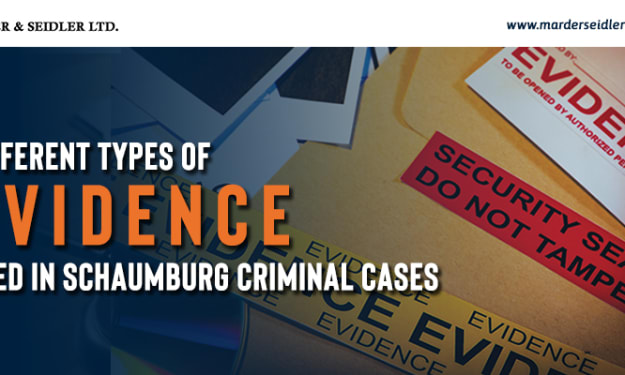How a Schaumburg Criminal Defense Lawyer Can Defend Someone Who's Guilty
Understanding The Role Of A Criminal Defense Lawyer

The role of a criminal defense lawyer is to protect the rights of the accused and ensure that they receive a fair trial. This includes providing legal counsel and guidance to the defendant throughout the legal process. Regardless of whether the defendant is guilty or innocent, it is the lawyer's duty to defend their client and uphold their constitutional rights. In fact, our society gives every citizen the right to be vigorously defended in a court of law, regardless of guilt. Thus, a criminal defense lawyer can defend someone who is guilty by ensuring that their client's rights are protected and that they receive a fair trial.
It is important to note that a criminal defense lawyer cannot admit guilt on behalf of their client if the defendant wishes not to. Instead, the lawyer's trial tactics should focus on the government's failure to prove all of the elements of the crime beyond a reasonable doubt .This means that a defense lawyer may argue that the prosecution has not met its burden of proof, or that the evidence against the defendant is weak or unreliable. By doing so, the lawyer is fulfilling their duty to defend their client to the best of their ability, regardless of guilt.
Ultimately, a criminal defense lawyer's job is to ensure that their client receives a fair trial and that their rights are protected throughout the legal process. This includes providing legal counsel and guidance, as well as advocating for their client in court. While a defense lawyer may not always know whether their client is guilty or not, they are obligated to defend their client to the best of their ability and uphold their constitutional rights. By doing so, a criminal defense lawyer plays a critical role in our justice system and ensures that every individual receives a fair trial, regardless of guilt or innocence.
The Role Of Lawyer In Defending A Guilty Client
One of the primary roles of a criminal defense lawyer is to ensure that their client's rights are protected and that the prosecution meets the burden of proof required to demonstrate guilt. All defendants are presumed innocent until proven guilty in a court of law, and a defense lawyer must view their client as such, regardless of any evidence that may suggest otherwise. The lawyer's job is not to prove their client's innocence but to prevent any injustices from occurring during the legal process. Therefore, a criminal defense lawyer can defend someone who is guilty by arguing that the evidence does not prove the elements of the offense beyond a reasonable doubt.
Negotiating a plea bargain is another way a criminal defense lawyer can defend someone who is guilty. A plea bargain is an agreement between the prosecution and the defense in which the defendant agrees to plead guilty to a lesser charge or receive a reduced sentence. A skilled defense lawyer can negotiate a plea bargain that may result in a reduced sentence for their client, even if they are guilty of the crime they are accused of committing.
In cases where the defendant is found guilty, a criminal defense lawyer can still be instrumental in mitigating the sentence. Mitigating circumstances, such as the defendant's age, mental state, or prior criminal history, can be presented to the judge to argue for a reduced sentence. A defense lawyer can also argue that the sentence should be reduced due to factors such as the defendant's cooperation with law enforcement or their remorse for their actions. Therefore, even if a defendant is guilty, a criminal defense lawyer can still play a crucial role in ensuring that they receive a fair and just sentence.
Ethical Considerations For Criminal Defense Lawyers
1. Upholding law and professional standards: One of the ethical considerations for criminal defense lawyers is upholding the law and professional standards. Despite representing individuals who may be guilty of a crime, defense lawyers must still adhere to the same legal and ethical standards as any other lawyer. This means that they cannot knowingly lie or mislead the court. However, they can vigorously defend their clients and challenge the prosecution's evidence to ensure that the legal process is fair and just. In fact, our society gives every citizen the right to be vigorously defended in a court of law, regardless of guilt or innocence.
2. Confidentiality and loyalty: Maintaining confidentiality and loyalty to the client is another important ethical consideration for criminal defense lawyers. Lawyers have a duty to keep their clients' information confidential, even if they know their client is guilty. This is essential to ensure that clients can trust their lawyers and that the legal system remains fair and impartial. Additionally, lawyers must remain loyal to their clients and provide them with the best possible defense, even if they personally believe their client is guilty. This is because a lawyer's duty is to defend the individual accused and protect their rights.
3. Advocacy and truthfulness: Balancing advocacy and truthfulness is another ethical consideration for criminal defense lawyers. While lawyers must zealously advocate for their clients, they cannot knowingly present false evidence or make false statements in court. Instead, they must focus on challenging the prosecution's evidence and presenting the best possible defense based on the facts of the case. Defense lawyers defend guilty clients all the time, but they do so to ensure that the legal process is fair.
Are You Facing Criminal Charges?
If you or your loved ones facing any criminal charges in Schaumburg, then, don’t delay and get the legal help from experienced criminal defense lawyer in schaumburg.
About the Creator
Marder and Seidler
Our Focused, Aggressive, and Dedicated Attorney Team is the best to help you in Divorce, Criminal, and Drunk n Drive offenses in Schaumburg and surrounding areas






Comments
There are no comments for this story
Be the first to respond and start the conversation.